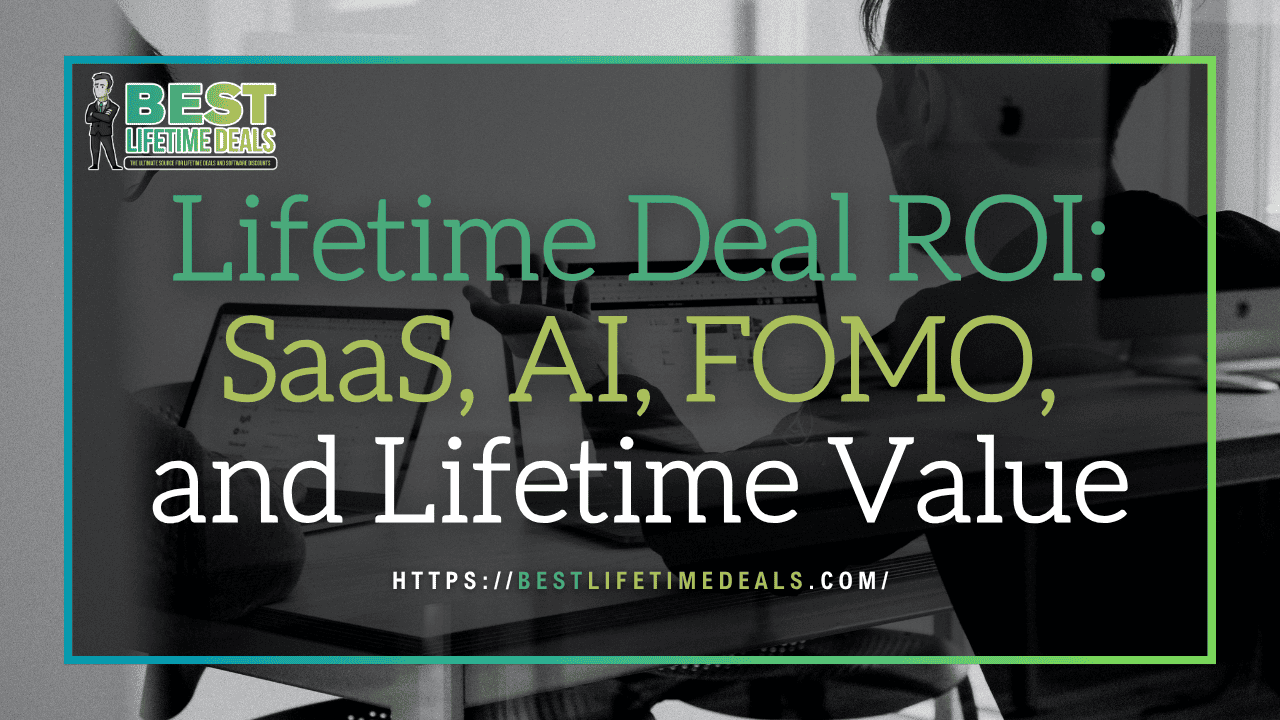
Lifetime Deal ROI: SaaS, AI, FOMO, and Lifetime Value
in AI Content, AI Tools, Business, Business Startups, Digital Marketing, Ecommerce, Make Money Online, PLR Products, Productivity, Social Media, Software AlternativesMaximizing Returns On Lifetime Deals For Long-Term Business Growth
In the dynamic world of SaaS and AI, lifetime deals (LTDs) have emerged as a unique strategy for startups and established companies alike. This article delves into the intricacies of LTDs, examining their benefits, the psychological drivers behind their appeal, and ultimately, how to calculate their return on investment (ROI). We’ll explore the role of FOMO, the importance of lifetime value, and how these elements interplay in the context of SaaS and AI solutions.

Understanding Lifetime Deals
What is a Lifetime Deal (LTD)?
A lifetime deal (LTD) offers permanent access to a software or service for a one-time payment, as opposed to a recurring subscription like a monthly subscription. These offers are often found on platforms like AppSumo and other deal sites. For SaaS companies, particularly startups, LTDs can be a quick way to generate upfront cash flow and attract early adopters. They contrast sharply with the traditional SaaS model which relies on recurring revenue through subscriptions. A potential customer gets permanent access, where they only pay once for the product, and this is often seen as too good to be true.
Benefits of Lifetime Deals in SaaS
Lifetime deals in SaaS (Software as a Service) have become increasingly popular among entrepreneurs, freelancers, and small business owners. These deals provide users with permanent access to software tools after a one-time payment, offering a variety of benefits compared to traditional subscription-based models. Understanding the advantages of SaaS lifetime deals can help you make smarter decisions when investing in digital tools.
1. Significant Cost Savings
The most obvious benefit of lifetime deals is the potential for substantial savings. Instead of paying recurring monthly or annual subscription fees, users pay a single upfront cost. Over time, this can result in hundreds or even thousands of dollars in savings, particularly for tools that would otherwise require ongoing payments.
2. Predictable Long-Term Costs
Lifetime deals provide budget predictability. Businesses and freelancers can plan their expenses without worrying about price increases or unexpected renewal fees. This is particularly useful for startups and small businesses with tight budgets.
3. Full Access to Software Tools
Most lifetime deals offer full access to the core features of the software, allowing users to utilize the tool as intended. Many providers also include updates and support, ensuring the software remains functional and secure over time. Users can integrate these tools fully into their workflow without limitations.
4. Increased Productivity and Efficiency
By gaining lifetime access to essential SaaS tools, users can streamline workflows, automate repetitive tasks, and enhance productivity with lifetime deals. These tools often cover areas like project management, marketing, content creation, and analytics, helping teams and individuals work more efficiently.
5. Flexibility and Long-Term Planning
Lifetime deals allow users to plan long-term strategies without worrying about ongoing costs. Whether it’s integrating software into multiple projects, sharing access across teams, or scaling operations, lifetime access provides flexibility and reliability that subscription models may not offer.
6. Early Access to New Features
Many SaaS providers offer lifetime users early access to updates and new features, ensuring they stay ahead of the curve. This gives users a competitive advantage by allowing them to leverage new tools and functionalities as soon as they are released.
7. Perfect for Entrepreneurs and Small Businesses
For entrepreneurs, freelancers, and small business owners, lifetime deals are especially beneficial. They reduce recurring overhead costs, allow access to professional-grade tools, and provide long-term reliability—all critical for growing a business efficiently.
8. Peace of Mind
With a lifetime deal, users can enjoy peace of mind knowing that their software will remain accessible and fully functional for years to come. There’s no need to worry about missed payments or canceled subscriptions, which ensures uninterrupted workflow and productivity.
Lifetime deals in SaaS offer a unique combination of cost savings, long-term access, and enhanced productivity. By paying once, users gain permanent access to essential tools, reduce recurring expenses, and can confidently plan their long-term business operations. These deals are particularly valuable for entrepreneurs, freelancers, and small businesses seeking reliable, affordable software solutions. When chosen wisely, lifetime SaaS deals can provide unmatched value and support business growth for years to come.
FOMO: The Driving Force Behind LTDs
FOMO, or Fear Of Missing Out, is a potent psychological factor driving the popularity of LTDs. The limited time nature of most LTDs creates a sense of urgency, pushing potential customers to make quick decisions. This is especially true for entrepreneurs, freelancers, and marketers who are constantly seeking tools that solve real problems and automate their workflow. The perception of acquiring a valuable tool for a fraction of its potential lifetime value is a powerful motivator, making LTDs highly attractive even if the immediate need isn’t fully apparent. People don’t want to miss out on an all-in-one deal or AI tools that can improve their productivity.

Calculating ROI on Lifetime Deals
Defining ROI in the Context of LTDs
Calculating ROI on a lifetime deal differs significantly from traditional investment analysis. With a lifetime deal, the one-time payment is weighed against the perceived lifetime value derived from the SaaS product or AI tool. ROI, in this context, is not just about recouping the initial one-time investment. It’s about understanding the long-term benefits, such as increased productivity, streamlined workflow, or the potential cost savings compared to recurring subscription models. It requires strategic planning to realistically assess the total value gained over the lifespan of using the SaaS offering.
Factors Influencing ROI for SaaS Products
Maximizing the return on investment (ROI) for SaaS products is a top priority for businesses, freelancers, and entrepreneurs who rely on software tools to improve efficiency and grow their operations. Understanding the key factors that influence ROI can help you make smarter decisions when selecting SaaS tools, including lifetime deals or subscription-based software.
1. Software Cost and Pricing Model
The first factor that directly impacts ROI is the cost of the SaaS product and its pricing model. Lifetime deals, which require a one-time payment, often offer higher long-term ROI compared to recurring subscriptions, as they eliminate ongoing fees. Subscription models may have lower upfront costs but can accumulate significant expenses over time, reducing ROI if the tool isn’t fully utilized.
2. Feature Relevance and Usability
ROI is heavily influenced by how well the SaaS product meets your business needs. A tool with features that directly align with your workflows, processes, and objectives will provide higher operational efficiency and greater value. Conversely, tools with unnecessary or complex features can reduce ROI by requiring more time and effort to learn and use effectively.
3. Adoption and Team Engagement
A SaaS product only delivers value if it’s actively used by the team. ROI increases when employees or team members fully adopt the software, leverage its key features, and integrate it into daily operations. Lack of adoption or resistance to change can significantly reduce the potential return from any SaaS investment.
4. Integration with Existing Systems
SaaS tools that integrate seamlessly with your existing software stack contribute to higher ROI. For example, connecting a project management app with communication, file storage, or CRM systems reduces manual work, streamlines workflows, and saves time. Poor integration can lead to inefficiencies, duplicated effort, and reduced ROI.
5. Training and Support
The availability of training resources and customer support influences ROI. SaaS products that provide clear tutorials, guides, and responsive support enable users to quickly understand the software and use it effectively. Without proper support, teams may struggle to realize the software’s full potential, reducing the return on investment.
6. Scalability and Flexibility
ROI is higher when a SaaS product can scale with your business. Tools that accommodate team growth, additional users, or increasing workload without substantial additional costs deliver better long-term value. Flexible SaaS solutions that adapt to evolving business needs ensure that the investment remains relevant over time.
7. Performance and Reliability
The performance, uptime, and reliability of a SaaS product directly affect ROI. Frequent downtime, bugs, or slow performance can disrupt operations, reduce productivity, and negatively impact your return. Reliable software ensures consistent value and uninterrupted business processes.
8. Measurable Outcomes
ROI is easiest to track when SaaS tools provide analytics and reporting features. The ability to measure key metrics, such as productivity gains, cost savings, or revenue impact, allows you to quantify the return from the software and make informed decisions about continued investment.
9. Long-Term Value
Finally, considering the long-term value of a SaaS product is crucial. Lifetime deals or subscription tools that continually improve through updates and new features provide ongoing benefits, increasing ROI over time. Products that stagnate or lack innovation may deliver diminishing returns, even if they seemed valuable initially.
The ROI of SaaS products is influenced by multiple factors, including cost, feature relevance, adoption rates, integration, support, scalability, reliability, and measurable outcomes. By carefully evaluating these elements before purchasing, businesses and freelancers can maximize the value of their software investments. Choosing the right SaaS tools—whether through lifetime deals or subscription plans—ensures long-term efficiency, cost savings, and enhanced business performance.

Leveraging AI in Lifetime Deals
AI Tools Enhancing SaaS Lifetime Deals
The integration of AI into SaaS platforms is revolutionizing the value proposition of lifetime deals. AI tools are increasingly offered as part of LTDs, providing users with advanced capabilities like automated content creation, intelligent data analysis, and personalized customer experiences. These AI-driven features amplify the lifetime value of the SaaS, making the one-time investment even more attractive. Startups that offer AI-enhanced tools through platforms like AppSumo can attract early adopters eager to leverage cutting-edge technology. The promise of long-term access to AI tools is a strong selling point for lifetime deals, and it makes these offers seem too good to be true.
Value Proposition of AI in LTDs
The value proposition of AI in lifetime deals centers around increased productivity and efficiency. AI tools can automate many tasks, freeing up time for entrepreneurs, marketers, and freelancers to focus on strategic initiatives. For example, an AI-powered email marketing platform offered as a lifetime deal can automate email campaigns, personalize messages, and optimize send times, leading to significant improvements in engagement and conversions. The upfront investment in an AI LTD can quickly pay for itself through increased productivity and reduced operational costs, making it a compelling offer.
Future Trends: AI and the Evolution of Lifetime Deals
The future of lifetime deals will be increasingly intertwined with AI. As AI technology continues to advance, more sophisticated AI tools will become available through LTDs. We can expect to see AI-powered platforms offering features like predictive analytics, personalized recommendations, and automated decision-making, all available for a one-time payment. Startups need to leverage AI LTDs to introduce innovative AI solutions to the market and attract early adopters. This trend will drive the evolution of LTDs, making them an even more valuable and sought-after resource for businesses looking to invest in tools for long-term growth.

Platforms for Finding Lifetime Deals
AppSumo: A Leading Marketplace for LTDs
AppSumo has established itself as a leading marketplace for lifetime deals, particularly in the SaaS and AI space. The platform curates a wide variety of LTDs, ranging from marketing tools and productivity apps to design software and AI-powered solutions. AppSumo provides a platform for startups to reach a large audience of potential customers, while also offering entrepreneurs and freelancers the opportunity to invest in tools for a one-time payment. The platform’s focus on quality and value has made it a go-to destination for anyone seeking affordable, long-term access to SaaS and AI technologies.
Comparing Other Platforms for Lifetime Deals
While AppSumo is a prominent player in the LTD market, several other platforms also offer lifetime deals. Deal sites like PitchGround, StackSocial, BestyLifetimeDeals and Dealify and occasionally even individual SaaS companies through their own websites, can present alternative options. Comparing these platforms is essential for finding the best fit for your needs. Factors to consider include the types of SaaS products offered, the pricing, the quality of customer support, and the platform’s reputation. Exploring various platforms helps ensure you’re getting the most value and the best possible ROI on your one-time investment.
Tips for Selecting the Best Lifetime Deals
Lifetime deals on AI software, SaaS apps, and digital tools offer an incredible opportunity to save money while gaining long-term access to essential tools. However, not all lifetime deals provide the same value, and selecting the right one requires careful evaluation. Here are some expert tips for choosing the best lifetime deals:
1. Evaluate the Software Provider’s Reputation
Before committing to a lifetime deal, research the SaaS provider. Check their track record, years in business, and reviews from other users. A reputable provider is more likely to deliver ongoing support, updates, and feature improvements, ensuring that your investment retains value over time.
2. Review the Features Included
Not all lifetime deals include every feature of a software product. Carefully examine the deal’s terms to confirm which features are included. Ensure that the core functionalities you need for your business or personal use are available, and consider whether any advanced features might require additional fees later.
3. Assess Long-Term Value
Consider the long-term value of the software. Even if a lifetime deal has a low upfront cost, it may not be worthwhile if the software doesn’t meet your needs or is likely to become obsolete. Look for tools that offer regular updates, new features, and compatibility with evolving workflows.
4. Check for Updates and Support
Lifetime deals should ideally include software updates and customer support. Confirm whether the deal covers future updates, bug fixes, and technical assistance. Tools that continue to improve and evolve provide more value over time than those with limited or no support.
5. Understand Usage Limits
Some lifetime deals may impose restrictions, such as limited users, projects, or storage. Verify these limits to ensure the software can support your requirements, both now and as your business grows. This is particularly important for team-based or collaborative tools.
6. Consider Integration Capabilities
SaaS tools are most valuable when they integrate seamlessly with your existing workflow. Check if the software supports integrations with other tools you use, such as project management apps, CRM systems, or communication platforms. Strong integration capabilities enhance efficiency and increase ROI.
7. Evaluate Pricing vs. Subscription Costs
Compare the cost of the lifetime deal with the equivalent recurring subscription fees. Lifetime deals often provide significant savings, especially if you plan to use the tool for years. Calculating the potential long-term savings helps you determine if the deal is truly worth it.
8. Read User Reviews and Testimonials
User reviews provide insights into the real-world experience of using the software. Look for feedback on performance, reliability, support, and the overall experience of the lifetime deal. Reviews can help identify potential issues that aren’t apparent in the deal description.
9. Take Advantage of Trials and Demos
If available, use free trials or demos before purchasing a lifetime deal. Testing the software firsthand ensures that it meets your needs and expectations. This step reduces the risk of investing in a tool that may not fit your workflow or preferences.
10. Prioritize Your Business or Personal Needs
Finally, ensure that the lifetime deal aligns with your specific goals. Focus on tools that solve a particular problem, enhance productivity, or support business growth. Avoid being swayed by flashy deals that don’t provide meaningful value for your situation.
Selecting the free lifetime deals requires careful consideration of the provider, features, long-term value, updates, usage limits, integration capabilities, and pricing. By following these tips, you can identify deals that offer maximum savings, ongoing value, and productivity benefits, making your investment in lifetime SaaS tools a smart and cost-effective choice.

Frequently Asked Questions
What is a lifetime deal and how does it fit into a small business strategy?
A lifetime deal (ltd) is a unique opportunity for small businesses (smbs) to offer their products or services for a one-time upfront payment, often at a discounted rate. This approach can help build a user base quickly and improve customer satisfaction by providing long-term value without recurring fees. By integrating lifetime deals into their strategy, businesses can validate their product-market fit and gather feedback from early adopters.
How do lifetime deals contribute to product development?
Lifetime deals can be a game-changer for product development, allowing small businesses to secure investments in tools that enhance their offerings. By attracting ltd buyers, businesses can gain insights into user preferences and pain points, helping to refine their product roadmap. The feedback gathered from these early users can guide adjustments and improvements, ultimately leading to a better product.
Can lifetime deals help in market research for small businesses?
Yes, using lifetime deals can significantly aid in market research. By analyzing the number of users who take advantage of these offers, businesses can identify trends and preferences within their target audience. This data can inform future marketing strategies and product iterations, ensuring the business remains aligned with customer needs and expectations.
What role does SEO play in promoting lifetime deals?
SEO is crucial when promoting lifetime deals, as it helps increase visibility and attract the right customers. By optimizing content around keywords like “lifetime deal” and “ltd,” businesses can drive organic traffic to their offers. Effective SEO strategies can enhance word of mouth and referral traffic, further boosting the exposure of these unique opportunities.
How can case studies illustrate the success of lifetime deals?
Case studies showcasing successful implementations of lifetime deals can serve as powerful testimonials for small businesses. They provide concrete examples of how other companies have effectively used ltds to grow their user base and enhance customer satisfaction. These narratives can help build trust with potential customers and illustrate the value proposition of offering lifetime deals.
What are the advantages of offering multiple subscriptions versus lifetime deals?
While multiple subscriptions provide a steady stream of recurring fees, lifetime deals create a sense of urgency and FOMO (fear of missing out) among potential customers. Offering ltds can lead to a more engaged user base that feels they are part of an exclusive community. However, businesses must balance these strategies to ensure they maintain a sustainable revenue model.
How can small businesses leverage affiliate links with lifetime deals?
Small businesses can leverage affiliate links to promote their lifetime deals, incentivizing affiliates to drive traffic and sales. This strategy can expand the reach of the offer and tap into new networks. By collaborating with affiliates who align with their brand, businesses can enhance their marketing efforts and potentially increase their user base significantly.
What tiers should be considered when structuring lifetime deals?
When structuring lifetime deals, businesses should consider offering different tiers to cater to varying customer needs. Each tier can provide different features and benefits, enabling customers to select the option that best fits their requirements. This approach not only enhances customer satisfaction but also allows businesses to validate their offerings across different market segments.
